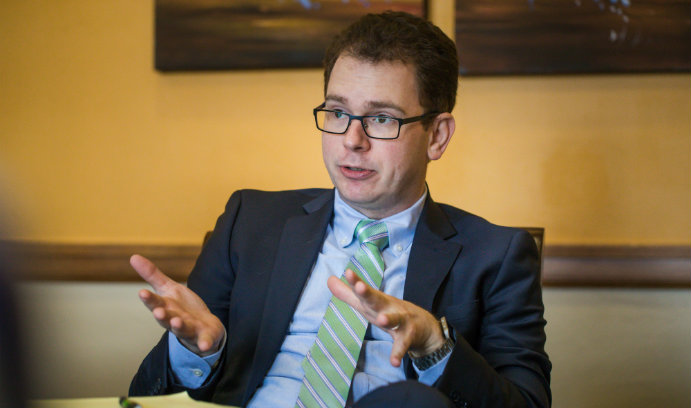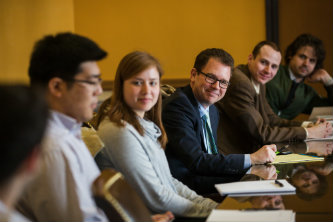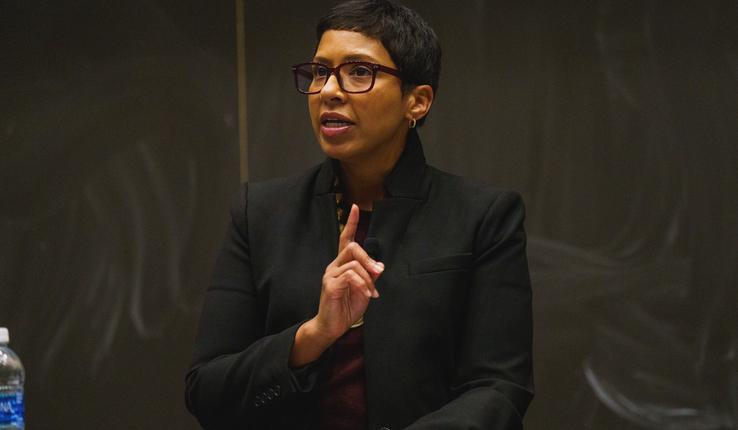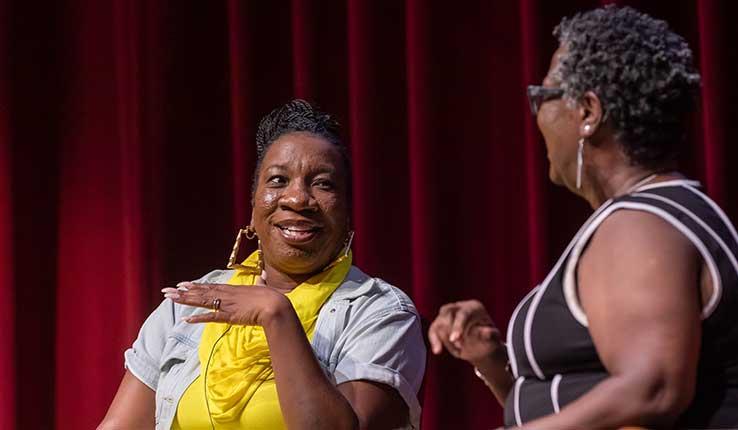Tresolini Law Lecture Focuses on Early Days of the Republic

Cost met with a group of undergraduate and graduate students prior to his 50-minute lecture.
Political historian, journalist, elections analyst and National Review contributor Jay Cost delivered this year’s Tresolini Lecture earlier this month, regaling his audience with an engaging analysis of the early days of the Republic. In a talk titled “James Madison, Alexander Hamilton, and the Struggle for Republican Government,’” Cost shared his nuanced understanding of the challenge of creating a new American government, and the men who shaped it.
Cost was introduced by Sean Beienburg, assistant professor of political science. Beienburg, who organizes the Tresolini Lecture, listed a long line of legal luminaries who came to Lehigh over the years. The list includes future U.S. Supreme Court Justice Antonin Scalia, former Watergate-era White House Counsel John Dean, Bush v. Gore attorney David Boies, Innocence Project founder Barry Scheck and former U.S. Attorney General Janet Reno.
“I have to say, as a non-lawyer, it’s a little intimidating to give a Tresolini Law Lecture,” Cost said. “But I take comfort in the fact that James Madison was not a lawyer, and the Constitution doesn’t belong just to lawyers. It belongs to the people. Still, to this day, it remains a public document—a document of the people.”
And with that, Cost launched into a 50-minute exposition of the differing approaches of the efforts of Founding Fathers Madison and Hamilton in forging a new Constitutional order. Both, Cost said, were profoundly influenced by Scottish philosopher and historian David Hume. Hume expressed “a pretty pessimistic view of human nature,” said Cost, who outlined Hume’s dim view of the human capacity for reason and moral clarity.
Building on the social contract theory articulated by English political philosopher Thomas Hobbes in the mid-17th century (and later, Cost said, justified by 17th century political theorist John Locke, who proposed a form of limited, liberal government), both Hamilton and Madison found agreement with the concept of a government based on popular sovereignty.
But by roughly 1784, the reality of this approach manifested in “13 states acting in narrow conception of these interests, rather than the greater good,” Cost said. It is at this point where the more classically conservative Hamilton wanted to interpret popular sovereignty in the narrowest way possible.
“Hamilton felt that you can’t give the masses excessive responsibility to elect their own representatives,” Cost said. “He believed citizens didn’t possess the wisdom and virtue needed for this decision, which is why you would need an electoral college. Both men started from the same Hume-based position, but ultimately go in very different directions. Madison was concerned that there was no guarantee that power would be used for the greater good, and didn’t like the idea of the Hamiltonian elite. Moreover, he didn’t have faith that a natural aristocracy would always be present.”
In the ensuing years, political parties coalesced around differing points of view, with constitutional order evolving to reflect a much more Madisonian influence than Hamiltonian, said Cost, who examines this historical period in his forthcoming book, The Price of Greatness: Alexander Hamilton, James Madison and the Creation of American Oligarchy.
An independent voice
In 2016, Cost drew the ire of many in the Republican Party when he refused to endorse then-candidate Donald Trump, accusing the party leaders of doing “moral blackflips” to defend the controversial candidate. Since then, he has staked out an independent position, while still adhering to constitutional and conservative political values. As a public intellectual uninterested, he said, in churning out “click-bait” content, his views on a wide range of topics were of particular interest to the 12 undergraduate and graduate students he met with prior to his evening talk. In keeping with his principled stance, he avoided predictable partisan observations.
“Throughout his visit,” Beiensburg said, “including the lecture, question-and-answer session with attendees, and informal discussions with students throughout the day, Cost covered an incredibly wide range of topics, from Madison's constitutional theory and questioning Hamilton's elitism and tight connection to business interests, to controversial court cases, to party structures, to Gilded Age political corruption, just as I hoped from one of America's most insightful and broad-ranging political commentators. Students loved mixing it up with him. And, like Cost, I was very impressed and pleased by the sophisticated questions and perspectives they brought to the conversations."
The Rocco J. Tresolini Lectureship in Law was established in 1978, in memory of one of Lehigh’s most distinguished teachers and scholars, Rocco Tresolini (1920-1967), who served as professor and chair of the department of government. Cost was the latest in a long line of luminaries to deliver the Tresolini Lecture, including Julian Sanchez—a senior fellow at the Cato Institute and an expert on digital privacy—who delivered last year’s lecture and warned of the threat of an authoritarian state. Cost can be followed on Twitter at @JayCostTWS, where he offers observations on politics, sports and popular culture.
Photos by Christa Neu
Posted on:





